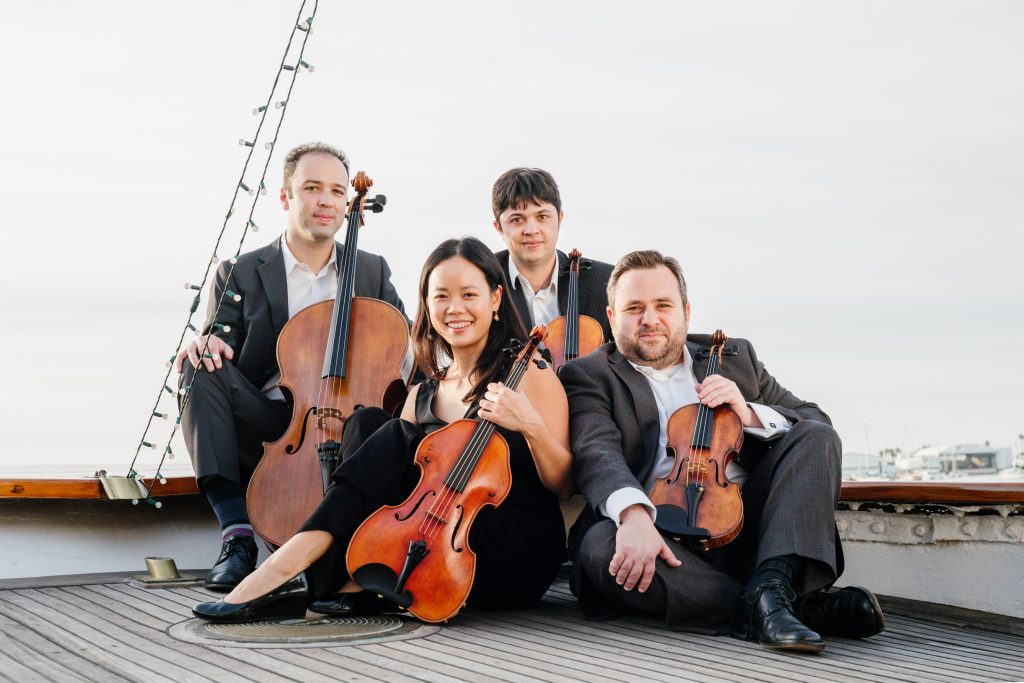Hausmann Quartet Pairs Andrew Norman and Stravinsky with Haydn
Having followed the Hausmann Quartet’s Haydn Voyages for the last three years, I have come to appreciate the inherent balance of expectation in the project’s programming. The part of me that finds comfort in predictability is assured that half of every program will be devoted to string quartets in the quintessential classical style of Joseph Haydn, and the part of me that craves the unexpected knows that the rest of each program will present recent compositions or lesser known quartets from the 20th century.

Hausmann Quartet: (from left) Alex Greenbaum, Angela Choong, Isaac Allen, Bram Goldstein [photo (c.) Samantha Zauscher]
Derek Katz, Haydn Voyages’ resident musicologist and commentator, aptly described Norman’s Peculiar Strokes as a kind of anti-string quartet because the composer takes a catalogue of nine bowing techniques either forbidden or rarely used and devotes a short movement of Peculiar Strokes exploiting each type of stroke. For example, the opening movement, “Rebound,” presents a progression of soft chords produced by the four string players simultaneously bouncing their bows lightly on the strings. In “Skip,” each player quickly slid a finger up and down a string on a quick bow stroke, creating what sounded like urban traffic noise—only cuter. “Stammer” required gapped strokes that resulted in an unsteady tone suggesting the speech defect named by the title, and “Scrape” resulted in a harsh but sustained, blurred pitch.
Norman’s work may sound a bit contrived, but the whole proved more rewarding and coherent than these quirky technical descriptions may suggest. Although I tried to find parallel reward in Stravinsky’s short, six-minute “Concertino,” his nonstop array of dark, aggressive themes defeated my best efforts. I credit first violin Isaac Allen for communicating an aptly mournful sentiment in the early extended theme accompanied by poignant pizzicatos from cellist Alex Greenbaum, but too much of this piece found these string players doggedly churning out busy motor themes.
Haydn’s D Major String Quartet , Op. 50, No. 6–sometimes called the “Frog” Quartet–opened the program on a confident note. Filled with ample playful motivic exchanges and a good deal of finely worked out counterpoint, this string quartet brought out Hausmann’s warmest ensemble sonority and consistently polished melodic displays. The spirited Finale offered the unusual motifs that give the string quartet its “Frog” nickname, although I would suggest that only string players hear a frog’s “ribbit” sound in the succession of quick notes played alternately on stopped and open strings.
Haydn’s D Major String Quartet Op. 64, No. 5–known as the “Lark” Quartet–is one of the composer’s more lighthearted quartets, although the Trio of the “Menuet” does boast a four-voice fugue. The beautifully crafted solos for the first violin that dominate this quartet, performed with persuasive elegance by Allen, give the piece its songbird nickname. Haydn’s final movement reveals more equality among the four players, and Hausmann met that challenge with assurance. In addition to Allen and Greenbaum, the other quartet members are violinist Bram Goldstein and violist Angela Choong.
This concert was the final Haydn Voyage of this year’s season, but Katz assured us that the new season for 2020 would be announced soon. It is a worthy project, and, after all, Hausmann has only 42 more Haydn string quartets to go!
The concert was presented by the Hausmann Quartet on Sunday, November 10, 2019, at the Maritime Museum of San Diego’s Berkeley moored on San Diego Bay.

Ken Herman, a classically trained pianist and organist, has covered music for the San Diego Union, the Los Angeles Times’ San Diego Edition, and for sandiego.com. He has won numerous awards, including first place for Live Performance and Opera Reviews in the 2017, the 2018, and the 2019 Excellence in Journalism Awards competition held by the San Diego Press Club. A Chicago native, he came to San Diego to pursue a graduate degree and stayed.Read more…
